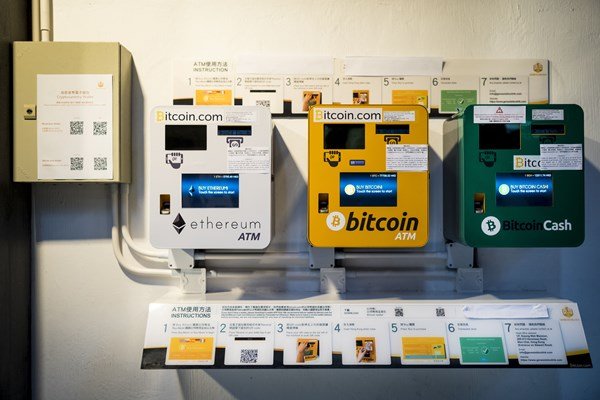ATMS BECOME NEXT BATTLEGROUND FOR CRYPTOCURRENCY...

Walk into a Prague subway station and chances are you’ll see an ATM. But you don’t need a debit card or even a bank account to use this machine. This is a cryptocurrency ATM. It’s the physical manifestation of a set of virtual currencies that have leapt out of the shadows of the underground to the mainstream of global finance. And it’s over these ATMs that the latest race in the cryptosphere is unfolding.
From Detroit to Delhi, and Santiago to Split, cryptocurrency ATMs are popping up around the world, catering to an interest that has been tempered by a crash in Bitcoin valuations this year. The first such ATM opened in 2013 at Waves coffee shop in Vancouver, British Columbia. Now, just five years later, more than 3,000 cryptocurrency ATMs populate train stations, factories, delis, hookah bars, tattoo shops, pubs and even pet clinics. These ATMs allow users to withdraw cash or cryptocurrencies like Bitcoin, Litecoin and Ethereum. And crypto kingpins are now duking it out for control of that exploding market.
Czech firm General Bytes, which has set up the machines in Prague, claims it has sold more than 1,700 cryptocurrency ATMs, in 53 countries, since 2014. EasyBit, a pioneer in the field, started in 2013, and has developed four machine models, selling more than 60 ATMs on four continents. An early-mover advantage has helped both firms spread out geographically. But while scale is their biggest ally, others are trying to make their mark with more sophisticated technology. Vault Logic, which is currently in its beta launch phase, is deploying so-called smart ATMs that allow users to buy and sell cryptocurrencies for global cash, and uses an operating system to accept third-party apps. This allows it to both sell cryptocurrencies for cash and offer additional services such as paying bills or topping up prepaid mobiles. Vault Logic has placed 10 prototype ATMs in high-profile Bitcoin “embassies” — spaces built to introduce more people to crypto technology — and more traditional venues such as downtown St. Paul, Minnesota, and the headquarters of internet retailer Overstock.com in Salt Lake City.

For those keen to steer clear of formal banking, this fast-expanding network of cryptocurrency ATMs is a godsend — allowing them to straddle the economics of virtual currencies with the reality of a world still dependent on fiat money.
“Crypto ATMs are now the only way I can have a functioning economy,” says Yoshi Livo, an entrepreneur and crypto promoter.
The growing spread of these ATMs is rooted in the increasing recognition of both the possibilities — and challenges — that these cryptocurrencies represent. Invented in 2008, Bitcoin started out as an internet-based currency to subvert traditional monetary structures. Early adopters saw cryptocurrencies as a way to operate outside of the global banking system given that transfers of funds could be made anonymously end to end.
Then came the steep rise and equally sharp fall. According to the cryptocurrency site CoinDesk, the price for Bitcoin jumped from $997.69 on Jan. 1, 2017, to $13,860.14 by Dec. 31 of that year. Then the price crashed, and is currently $6,363. Its rise and its still-high value made many investors warm up to the idea of cryptocurrencies. But few investors like the idea of purchasing cryptocurrency and being unable to exchange it for cash. This need paved the way for the Bitcoin ATM, say experts.
Mike Dupree, CEO of EasyBit, says he is targeting a customer base that’s already a part of the crypto ecosystem. He concedes that building customers outside of the crypto community is a challenge. There’s inadequate understanding of how it all works, and some struggle with the idea of interfacing with a decentralized, nonreversible currency like Bitcoin, he says. But the biggest barrier to expanding quickly in the U.S. is a banking environment that is at best uncertain for internet-based currencies.
The Securities and Exchange Commission has released a warning against cryptocurrencies. The Commodity Futures Trading Commission has allowed public trading of crypto derivatives, but these rules could always change. Furthermore, the Financial Stability Oversight Council has articulated concerns that cryptocurrencies could be used for money laundering.

The tumble crypto markets have taken over the past year hasn’t helped. Investors in cryptocurrency ATMs will have to successfully allay those fears to expand the crypto ecosystem, suggests Dupree.
But these risks aren’t stopping challengers from attempting innovative ways to take on the larger ATM manufacturers. Vault Logic CEO Doug Scribner says the current use of prototype ATMs at carefully selected locations is aimed at building excitement and recognition for his emerging brand.
Dupree also says he doesn’t worry too much about crypto skeptics. “The beauty of cryptocurrencies is that you don’t have to trust a financial institution to back your wealth,” he says. “Decentralization is the future, and regulation will eventually fall in line.”
Ultimately, Livo and others like him — who prefer staying off the grid of formal financial institutions — want just that: a world where they don’t need to interact with traditional currencies at all. But until the rest of the world believes that too, they will need to exchange cryptocurrencies for cold, hard, fiat cash. And for that, they’ll need the ATMs.